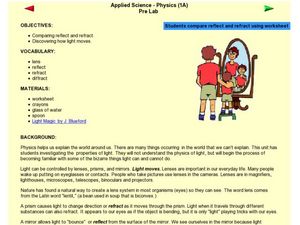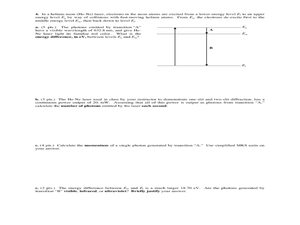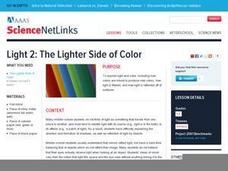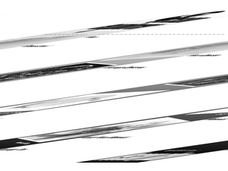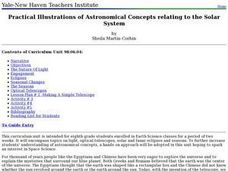Curated OER
The Sun's Energy
Sixth graders examine how the sun's energy arrives as light with a range of wavelengths. They discuss the characteristics of light, examine the color of light using a spectroscope, and conduct an experiment using water and thermometers....
Curated OER
Reflect and Refract
Students explore light. In this properties of light lesson, students define the terms refract, reflect, and diffract after listening to the teacher's description. Students listen to the book Light Magic and observe a spoon in a glass of...
Curated OER
Unraveling the Mysteries of Objects in Space
Learners study emitted and absorbed light, and label each type of spectrum. They identify elements by their spectral signatures and use a spectroscope.
Curated OER
Diversity: Using Light to Filter Prejudices
Students use physics to discuss diversity. In this social interaction lesson, students use their knowledge of colors and filters to relate it to stereotyping and prejudices.
Curated OER
Physics Final Exam
A two-hour final exam covers a range of physics topics related to electricity and magnetism. It employs a variety of methodologies for assessing your physics learners' understanding and mastery of these concepts. You will need to review...
Curated OER
The Lighter Side of Color
Middle schoolers explore light and color, including how colors are mixed to produce new colors, how light is filtered, and how light is reflected off of surfaces. They read materials provided, complete worksheets, and complete hands-on...
Curated OER
Starlight, Star Heat
In this stars worksheet, students read how astronomers calculate the temperature of a star by measuring its color. Students use a chart showing star temperatures and colors to complete 3 short answer questions.
Curated OER
Exploring Solar Beads
Learners discover solar energy beads and learn about ultraviolet light. In this solar energy instructional activity, students learn about solar energy beads, ultraviolet light, and UV radiation dangers. Learners experiment with the beads...
Curated OER
Reflection and Refraction
What is a prism? A place for light waves that commit minor refractions! The thorough resource includes three hands-on investigations covering light reflection and refraction; mirrors, lenses, and images; and optical systems. Subject...
Curated OER
Can You See the Music?
Fourth graders examine the makeup of the electromagnetic spectrum and how the various forms of EMRs are similar and different from each other. They, in pairs, solve problems from worksheets imbedded in this lesson plan.
Curated OER
Radiation from Space
In this radiation worksheet, students review the different types of radiation waves that come from space and the different telescopes used to detect this radiation. This worksheet has 17 true or false questions.
Curated OER
Summer Research Program for Science Teachers
Students analyze the optical region of the electromagnetic spectrum.
Curated OER
Electromagnetic Radiation and the Bohr Atom
In this light learning exercise, students calculate the frequency and wavelength. Students practice applying Planck's constant and determining the energy of a photon. This learning exercise has 9 problems to solve.
Curated OER
"Why Is the Sky Blue?"
Students investigate why the sky is blue and the sunset is red. They are asked why do you think that we see the sky as blue? Students write a hypothesis on their "Blue Sky Lab Sheet". They explain why they think that the sky is blue...
Curated OER
To See or Not to See
Students identify and discuss key factors that determine how effective color camouflage is in certain habitats. For this investigative lesson students divide into groups and study light.
Curated OER
Obtain a visible spectra of chlorophyll a
Learners become familiar with the concept of spectroscopy or the study of the interaction of matter with electromagnetic radiation. They prepare solutions and measure absorbance at different wavelengths. Pupils comprehend that mater and...
Curated OER
Ways to See the Sun
Students examine how the regions of the Sun are studied using spectroscopy. They investigate the electromagnetic spectrum and the types of radiation that are associated with it. They use prisms and CD's to examine the light spectrum....
Santa Monica College
Flame Tests of Metal Cations
Scientists used flame tests to identify elements long before the invention of emission spectroscopy. Young chemists observe a flame test of five metal cations in the fourth lesson plan of an 11-part series. Individuals then work...
Curated OER
Atomic Absorption Determination of Zinc and Copper in a Multivitamin
Advanced lab apprentices prepare zinc and copper solutions to which they will compare the same minerals from a multivitamin. Using absorption spectroscopy, they analyze the contents of the multivitamin for concentration. This lab can be...
Colorado State University
Why Does it Get Colder on a Clear Night than a Cloudy Night?
Clouds are nature's insulator! A lab investigation asks learners to use an infrared thermometer to measure differences in infrared temperatures. They find that pointing the thermometer at a cloud has a much different result than pointing...
Curated OER
Practical Illustrations of Astronomical Concepts Relating to the Solar System
Eighth graders are introduced to concepts related to the Solar System. In groups, they participate in an experiment in which they must describe a ray of light and how it travels. They draw a diagram of the electromagnetic spectrum and...
Curated OER
(S-4) The Many Colors of Sunlight
Young scholars observe and explore the characteristics of light.
Curated OER
Chloroplasts and Pigments
In this plant pigments worksheet, students compare the function of 3 types of pigments: chlorophylls, carotenoids, and phycobilins. This worksheet has 23 fill in the blank, 3 drawing, and 2 short answer questions.
Curated OER
Examining Spectra
Students examine the spectra with the use of light while constructing their own spectroscope. They make observations about the colors and visible wavelengths of light and then conduct classroom discussions. As an extension students read...



